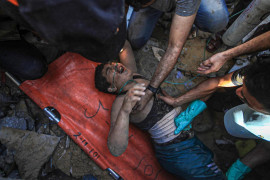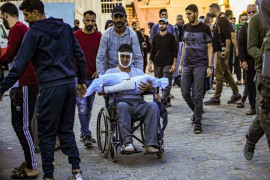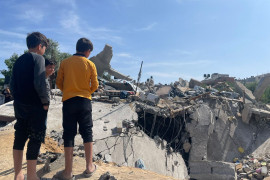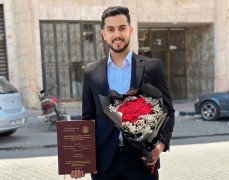CHRONICLES FROM HELL (19)
Voices from the rubble of Gaza
Gazans tell of the extreme suffering being caused by Israel's genocide
Mahmoud Mushtaha Ciudad de Gaza , 23/01/2024
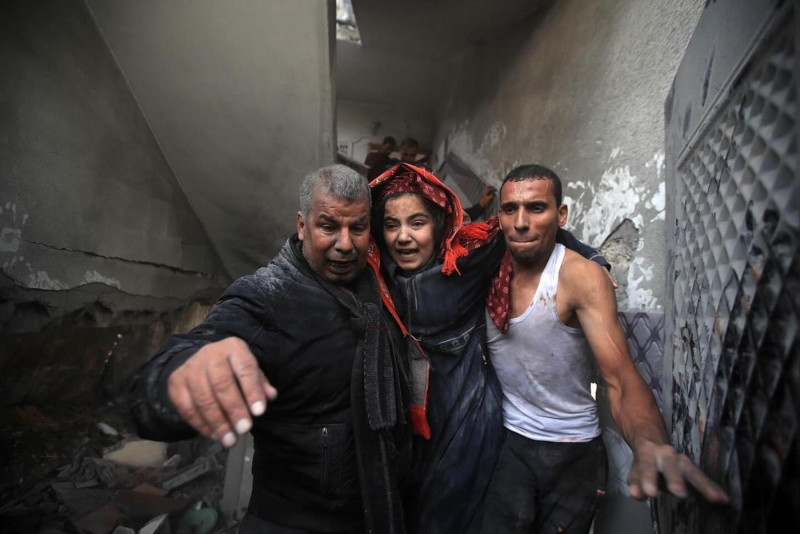
Varios civiles desalojan un bloque de viviendas tras ser atacado por el ejercito israelí en enero de 2024. / Mohammed Zannoun
En CTXT podemos mantener nuestra radical independencia gracias a que las suscripciones suponen el 70% de los ingresos. No aceptamos “noticias” patrocinadas y apenas tenemos publicidad. Si puedes apoyarnos desde 3 euros mensuales, suscribete aquí
In the 17 years of blockade and suffering endured by Palestinians in the besieged Gaza Strip, currently embroiled in a fierce war that has been raging for more than 100 days, civilians bear the brunt. Testimonies from this ongoing Israeli war reflect a desperate plea: “We are dying, waiting for our turn; Israel and the world have sentenced us to death”. Stories and tales lie buried in blood beneath the rubble of destroyed houses in Gaza, untold and unheard. Faced with the danger of truth suppression and victim silencing, I, as a palestinian journalist, strive to convey the indescribable suffering and tragedy of our lives in Gaza. The aim is to show that we are not mere numbers but individuals enduring the harsh reality.
In the Gaza Strip, citizens endure tragic and painful suffering. Mohammed Shehadeh, 29, encapsulates the anguish: “Our hearts cry blood for our lives”. Mohammed was compelled to evacuate his home, in Jabalia, as Israeli tanks closed in, but he couldn't rescue his parents, still trapped inside. His attempt to leave was not an isolated incident; everyone in his vicinity faced displacement due to the entering Israeli tanks. It's a known reality that when the Israeli army enters an area, buildings are demolished, and those who remain in houses face the risk of being killed or tortured.
“I didn't want to leave my mother and dad alone at home and evacuate. My parents are old, and my mother, in particular, was injured in this war. With the absence of hospitals, her eye injury became untreated, making it invisible. I insisted on not leaving my house due to the difficulty of moving with them. However, when tanks close to the streets near our house, it felt as if the house was shaking, and the intensity of the fire made it seem like it would fall”, Shehadeh explained. “My parents insisted that we leave them at home and move far away from the tanks. Until now, I don't know how they are. Every second and every minute, I remember them, especially the last thing my father said, ‘Go, son, you are young, and you have a life to enjoy. We will have nothing left of our lives’. What age and what kind of life can I live without my parents?” Mohammed added tearfully. So far, the fate of the Shehadeh family is unknown, and Mohammad cannot reach the area where his family is.
Makawi hosam, 33, faced the specter of death as Israeli tanks entered Gaza City. “The Israeli army subjected us to various forms of death –humiliation, insults, and indiscriminate shooting. Forces stormed our Al-Jalaa neighborhood, raining gunfire on houses. For thirteen consecutive days, we dared not leave our room”, recounted Hosam. “The Israeli military engages in torturing, insulting, and senselessly killing civilians in their homes. The tanks' terrifying noise shook our house; they knew we were there – 56 people, including children and women. Deliberately targeting glass windows, they rendered us speechless and helpless”.
Makawi and his family endured a two-week detention with no movement. Crawling between rooms, Makawi fetched water. “In Gaza, food is scarce. During the Israeli tank siege, we had little water, no bread –just uncooked rice. For two weeks, we relied on water, moistening our lips and eating biscuits”, he explained. The army fired tank shells at the trapped, causing civilian injuries and deaths. “My uncle's wife bled from her injured foot for eight days. After the tanks left, a doctor advised amputation, but there's still no equipment or operating room for her surgery”.
The Euro-Med Human Rights Monitor has documented numerous instances of field executions by the Israeli army in the Gaza Strip during its ongoing conflict. These executions took place as the army entered the land, besieging citizens and displaced individuals in shelters. Mohammed Nasser, 44, witnessed, in Kamal Adwan Hospital square, an occupying soldier's sniper firing at a pregnant woman carrying a white badge, heading for childbirth, resulting in her cold-blooded execution.
At the Najmeddin Erbakan School, Israeli forces committed appalling crimes, etched in the memories of Gazans, yet the world remained indifferent to the massacre. Nafez Al-Zaaneen, 59, recounts the harrowing experience of burying 13 bodies with his own hands. “Israeli tanks entered the school at night, trapping us in classrooms. Around 9 PM, tank sounds surrounded the school, forcing us to hide. At 3 AM, the Israeli army, with its tanks, stormed the school. Indiscriminate firing, dogs unleashed on us, and gathering us in the schoolyard with tanks and dogs encircling, approximately 1,000 soldiers surrounding us”, he recounted.
“They separated the men from the women, placing us facing each other. Officers scrutinized us, selecting 45 men and herding them into the school playground. These individuals were instructed to dig graves for their impending execution. In fear, we complied with the officers' demands. Silence enveloped us as the army terrorized by firing machine guns at buildings. Those who dug graves with their bare hands were left naked for five hours before being executed, l recounts the witness with teary eyes. Nafeth Al-Zaanin and older men were tasked by the military to retrieve the bodies for burial outside the school. “I buried 13 bodies with my own hands; my hands still tremble. I can't do anything with them, I can't eat. The haunting scene remains etched in my mind, especially thinking about the children”, he expressed.
Despite the announcement by the Israeli army that it had completed its ground operation in northern Gaza, the army returned to its ground operations and penetrated into the borders of the northern Gaza Strip to all areas, including the area of Tal Al-Hawa and Sheikh Ajlin, where the army besieged the Mahfouz Al-Nanah Algerian school, executed 15 displaced people and forcibly displaced people to southern Gaza.
In the 17 years of blockade and suffering endured by Palestinians in the besieged Gaza Strip, currently embroiled in a fierce war that has been raging for more than 100 days, civilians bear the brunt. Testimonies from this ongoing Israeli war reflect a desperate plea: “We are dying, waiting for our turn; Israel...
Autor >
Suscríbete a CTXT
Orgullosas
de llegar tarde
a las últimas noticias
Gracias a tu suscripción podemos ejercer un periodismo público y en libertad.
¿Quieres suscribirte a CTXT por solo 6 euros al mes? Pulsa aquí





